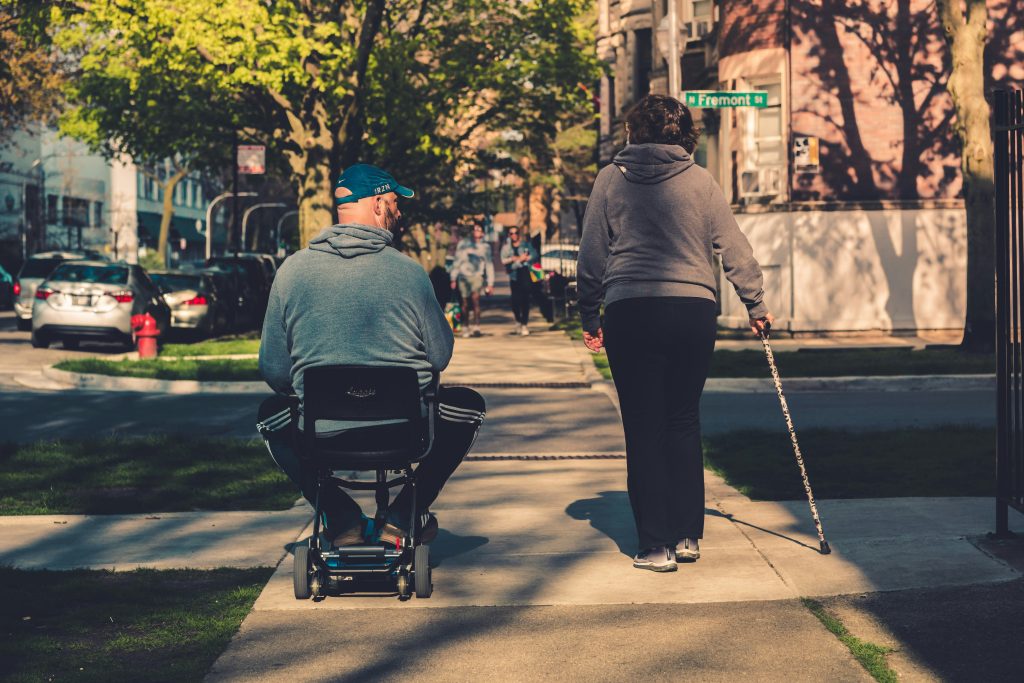Have you ever wondered whether you’ll need to leave a deposit when you rent a mobility scooter and what that process will look like?
Is There A Deposit Required When Renting A Mobility Scooter?
You’ll usually encounter a deposit requirement, but whether one is required depends on the rental provider, rental duration, and your payment method. This article will walk you through the common practices, amounts, exceptions, and steps you can take to reduce or avoid a deposit when renting a mobility scooter.
Quick answer: yes, often — but not always
Most rental companies will ask for some form of security, often as a refundable deposit or a credit card pre-authorization. Some vendors offer alternatives like damage waivers, higher daily rates, or no-deposit rental options in exchange for increased fees or proof of insurance.
Why rental companies ask for a deposit
Rental providers ask for deposits to protect themselves against damage, theft, or non-return of the equipment. Deposits also cover cleaning fees and unpaid rental charges if a customer leaves without settling the bill.
How deposits protect both parties
From the company’s perspective, a deposit reduces financial risk and incentivizes responsible use of equipment. For you, providing a deposit usually means you’ll get a piece of equipment that’s been maintained and vetted, and you’ll get your money back if you meet the return conditions.
Types of deposits and payment holds
You’ll see different ways companies secure rentals: refundable cash deposits, credit card pre-authorizations (holds), damage deposits, and non-refundable booking fees. Each method has different implications for your cash flow and liability.
| Deposit Type | How It Works | Typical Use | Pros for You | Cons for You |
|---|---|---|---|---|
| Cash or card refundable deposit | You pay an amount up front; refunded after safe return | Local shops, airports | Immediate clarity, sometimes easier for small shops | Ties up cash; refund processing time |
| Credit card pre-authorization (hold) | Vendor places a hold on your card for a set amount | Major chains, online bookings | No charge if you return scooter fine; often no immediate cash out | Reduces available credit until released |
| Damage waiver / insurance fee | You pay an extra fee to limit liability | Some vendors offer this as an add-on | Reduces or removes the need for large deposits | Non-refundable; may not cover all damage |
| Non-refundable booking fee | Small fee to secure booking | Online platforms, high-season rentals | Guarantees reservation | Not returned even if you cancel |
| Higher rental rate (no deposit) | Company eliminates deposit but increases daily rate | Some long-term or premium services | No upfront hold | Costs more over time |
Typical deposit amounts
Deposit amounts vary based on scooter value, rental length, and company policy. You can expect to encounter amounts from modest holds to larger security sums.
- Short-term low-power scooter: $50–$150
- Mid-range scooter: $150–$400
- High-end or travel/portable scooters: $300–$800
- Long-term rentals: deposits may be smaller relative to monthly fees or replaced with first/last month payment
Factors that influence the deposit amount
Your deposit will depend on the scooter model, the rental duration, your payment method, and the vendor’s risk policies. Seasonality, travel destinations, and whether the rental is local or through a third party also matter.
Scooter type and value
Higher-value scooters typically mean larger deposits because the replacement cost is higher if something happens. If you rent a travel-friendly foldable scooter, expect a different deposit than for a heavy-duty outdoor model.
Rental duration
Longer rentals may require a larger deposit or a different payment structure (for example, monthly billing with first and last payments) because the risk period increases. Conversely, very short rentals might have smaller deposits but higher daily rates.
Provider type and location
Independent medical shops may have different practices than national chains, cruise lines, airports, or hotels. Tourist-heavy locations often require stronger financial guarantees due to higher theft and damage risk.
Your payment method and credit history
Companies relying on credit card pre-authorizations will place holds based on card limits and perceived risk. If you pay with debit or cash, the vendor may ask for a larger upfront deposit because funds are immediately deducted.

Where you rent affects the deposit requirement
Different rental channels have different policies. You’ll want to compare the deposit expectation depending on whether you rent from a medical supply store, travel company, hotel, cruise line, or online rental platform.
Medical equipment suppliers and local stores
Local suppliers often require a refundable deposit or a credit card hold and may accept cash. These providers are usually flexible and may negotiate deposits for repeat customers.
National rental chains and online services
Larger companies commonly use credit card pre-authorizations, standardized deposit policies, and optional insurance add-ons. They often have clearer paper trails and faster dispute resolution.
Hotels, airports, and cruise lines
Hotels and cruise lines may ask for a deposit via your room or booking credit card as a guarantee; airport vendors may have stricter rules due to the transient nature of travelers. Deposits can be higher in these contexts, and release times may be longer after return.
Damage waivers and insurance: alternatives to large deposits
You’ll often be offered a damage waiver or rental insurance that reduces your out-of-pocket exposure in exchange for a daily or flat fee. Understand what’s covered before you decline the deposit or choose the waiver.
What a damage waiver usually covers
A waiver may cover accidental damage and sometimes theft, but it often excludes negligence, intentional damage, certain parts (tires, batteries), and loss. Always read the terms to see the deductible and exclusions.
When to buy the waiver
If the deposit is large and you want to reduce the hold on your card, paying for a waiver might make sense. Compare the total cost of the waiver plus rental versus the deposit amount and your risk tolerance.
How to reduce or avoid a deposit
You can take steps to negotiate, circumvent, or safely minimize deposit requirements. If you plan ahead and present the right documents, you can reduce financial friction.
Use a credit card rather than debit
Credit cards typically make vendors more comfortable because they provide easier recovery mechanisms. A pre-authorization hold on a credit card doesn’t withdraw cash, so it impacts only available credit.
Provide proof of insurance or a doctor’s referral
If you have medical equipment insurance or a letter from your healthcare provider authorizing the need, some suppliers will accept lower deposits or offer special terms. Presenting documentation can reduce perceived risk.
Opt for a damage waiver if cheaper than the hold
If the waiver lowers your upfront financial burden, choose it. Calculate total cost — sometimes waivers are cheaper for short rentals.
Become a repeat customer or request a loyalty agreement
If you’ll rent frequently from the same provider, ask to set up an account with on-file details. Repeat customers often get reduced deposits or pre-approval.
Book during off-peak times
Some vendors relax their policies in low season or when inventory is plentiful. Timing can influence deposit size.
What happens to the deposit after you return the scooter
After you return the scooter in acceptable condition, the company will either refund the deposit or release the pre-authorization hold. Timing varies by payment method and vendor.
Refund timelines and holds
If you paid cash or card and were charged, refund processing often takes 3–14 business days depending on the vendor and bank. Credit card holds are typically released immediately or within a few business days, but some banks may take longer to show the credit.
When deductions are made
If the scooter shows damage, excessive dirt, or missing parts, the company may deduct repair or cleaning costs from the deposit. You should receive an itemized list of charges and supporting photos or repair estimates.

Common reasons deposits are withheld or partially deducted
Knowing what triggers deductions helps you avoid losing money. You’ll likely face deductions for damage, missing accessories, theft, excessive cleaning, late return fees, and unpaid rental charges.
Examples of typical deductions
- Broken frames, steering or control damage
- Missing chargers, batteries, or seat components
- Battery problems due to misuse (overcharging, water damage)
- Excessive cleaning required after return
- Late fees if you return the scooter after the agreed time
How to protect your deposit — documentation checklist
You should document the scooter’s condition on pick-up and drop-off, keep receipts, and understand the rental agreement. This documentation is your best defense against unfair deductions.
| Item | Why it helps |
|---|---|
| Photos and video at pickup | Proves pre-existing damage or condition |
| Signed rental agreement copy | Shows terms and responsibilities |
| Receipts for payment and refunds | Verifies amounts charged and returned |
| Serial number and model details | Verifies exactly what you rented |
| Return time and location proof | Prevents late-fee disputes |
Steps to take at pickup and return
At pickup, walk around the scooter and record any scratches, dents, or missing parts with timestamps. At return, repeat the process and request a signed return inspection form. If the provider doesn’t perform an inspection, insist on documentation showing the time and condition of return.
Questions you should ask before agreeing to a deposit
Ask clear questions so you’ll know what to expect and avoid surprises. Having answers in writing will simplify any dispute later.
| Question to Ask | Why It Matters |
|---|---|
| Is a deposit required and how much? | Determines your immediate outlay |
| Is it a hold or an actual charge? | Affects cash vs credit availability |
| What items or damage are deducted? | Helps you prevent avoidable charges |
| How long until the deposit is released? | Sets expectations for refund timeline |
| Is there a damage waiver option and cost? | Helps you compare risk transfer vs hold |
| Are chargers and accessories included? | Avoid extra charges for missing items |
Negotiate terms if needed
If the deposit feels excessive, ask about alternatives — smaller hold, waiver option, or providing additional ID. Be polite and explain your circumstances; many providers are willing to work with responsible customers.
Payment methods and their implications
Your choice of payment method influences how deposits are handled and how quickly funds are available again.
| Payment Method | Typical Deposit Handling | Time to Release |
|---|---|---|
| Credit card | Pre-authorization or refundable charge | 1–10 business days after release (depends on issuer) |
| Debit card | Actual charge and refund | 3–14 business days after refund processed |
| Cash | Cash held and returned in person | Immediate on return (if documented) |
| Bank transfer | Vendor holds until return | Depends on vendor policy and bank processing |
| Third-party platforms (PayPal, etc.) | Platform-specific holds or fees | Varies by platform |
Why credit cards are usually best
Credit cards offer stronger consumer protections and simpler pre-authorizations. You’ll avoid immediate cash outlays and gain a buffer while the vendor completes their inspection.

Sample scenarios to illustrate deposits
Seeing concrete examples will help you understand how deposits work in practice. Below are a few typical situations you might encounter.
Short vacation rental from a local shop
You rent a basic scooter for 5 days from a local shop and they charge a $100 refundable deposit by card hold. You return the scooter clean and intact, and the hold is released within 48 hours by the bank.
Airport rental for a business trip
An airport vendor requires a $300 pre-authorization because of high theft risk. You pay by credit card; the hold reduces your available credit during the trip and is released 5–7 business days after return.
Extended rental through a national provider
You rent for three months and are asked to pay the first month and a refundable $200 deposit plus a small daily waiver fee. The vendor applies deductions only if there’s damage at the end of the rental period.
Cruise ship or hotel rental
The hotel places a deposit on your room card or a pre-authorization on your credit card. The release timing depends on the hotel’s policy and the banking institution; it may take longer post-cruise or after checkout.
How to dispute deposit deductions
If you believe deductions are unfair, you’ll want to follow a structured process: gather evidence, contact the vendor, escalate if needed, and use payment protections.
Steps to dispute
- Collect all documentation: photos, signed agreements, receipts.
- Contact the rental provider promptly and ask for an itemized explanation and evidence for the deduction.
- If you can’t resolve it, file a dispute with your credit card issuer or payment platform, providing your documentation.
- Consider small claims court or a consumer protection agency if the deduction is substantial and unresolved.
Legal protections and consumer rights
Your rights vary by state and country, but in many places you’re protected against deceptive practices and unfair withholding of funds. You’ll benefit from knowing the basics of consumer protection in the area you’re renting.
What to look for in your jurisdiction
Check local laws about security deposits and pre-authorizations, consumer disclosure requirements, and maximum timelines for returning deposits. Consumer protection agencies can guide you on legal steps if a vendor acts improperly.
International rentals and cross-border considerations
When you travel overseas, deposit practices may change, and the legal protections you have at home might not apply. Be aware of currency holds, international card policies, and different vendor practices.
Currency conversions and hold amounts
If a vendor places a hold in a foreign currency, your bank will convert it, which can temporarily affect your available funds differently than a domestic hold. Exchange rate fluctuations may impact the refunded amount until the currency converts back.
Different legal and cultural norms
In some countries, deposits are larger due to higher perceived risk or less stringent rental markets. Ask about local norms and read reviews of the rental company when traveling abroad.
Special situations: cruise lines, hotels, and theme parks
These environments have unique policies due to high foot traffic and unique operational constraints. Your deposit expectations should be adjusted accordingly.
Cruise lines
Cruise lines often require a deposit via your onboard account or credit card, and returns may take longer due to delayed processing until after the cruise disembarks. Theft risk is often higher, so deposits and waivers might be stricter.
Hotels and resorts
Hotels may use your room guarantee or credit card to cover deposits; you should check whether the deposit is separate from incidental holds and how long it takes to release after checkout.
Practical tips for a smooth rental experience
Small actions on your part can prevent disputes and speed refunds. Prepare in advance and follow vendor instructions.
- Request the rental agreement in writing and read it fully before signing.
- Photograph the scooter from multiple angles at pickup with timestamps.
- Test the scooter briefly and report any issues immediately.
- Keep all receipts and return documentation.
- Return the scooter on time and where agreed to avoid late fees.
- If possible, return the scooter during business hours to get a signed return inspection.
Typical pitfalls and how to avoid them
Many deposit disputes stem from unclear expectations or lack of documentation. Being proactive will reduce stress and financial surprises.
Common mistakes
- Not documenting pre-existing damage at pickup
- Assuming a hold is the same as a charge
- Forgetting to get a written return receipt
- Overlooking exclusions in a damage waiver
How to avoid them
Always get things in writing, take photos, and review the vendor’s damage and cleaning policy before accepting the rental.
Environmental and battery concerns that may affect deposits
Battery misuse and environmental exposure can cause costly damage, and vendors may deduct repair costs from your deposit. Pay attention to battery handling instructions.
Battery care tips
Charge according to manufacturer instructions, avoid exposing batteries to rain or saltwater, and don’t attempt repairs yourself. If the battery is damaged due to misuse, expect deductions.
Summary: what you should expect and how to be ready
You’ll most likely be asked for a deposit or pre-authorization when renting a mobility scooter, but terms vary widely by provider, location, and rental length. Being informed, documenting everything, and asking the right questions will help you minimize financial risk and protect your deposit.
Final practical checklist before signing
- Confirm deposit amount and whether it’s a hold or charge.
- Ask how long until the deposit is released.
- Inspect and photograph the scooter at pickup and return.
- Decide whether a damage waiver makes sense for you.
- Keep copies of all rental documents and receipts.
Frequently asked questions (FAQs)
These quick answers will help with the most common concerns about deposits and mobility scooter rentals.
Will a rental company charge my card or just place a hold?
It depends on the vendor. Many places use a pre-authorization hold, but some will actually charge your card and refund it later. Ask explicitly which method they use.
How long does it take to get my deposit back?
Refund timing varies: immediate releases are rare, credit card holds typically drop within 1–10 business days, and debit refunds can take up to two weeks. Banks and payment processors influence timing.
Can I use a debit card, or do I need a credit card?
You can often use a debit card, but vendors may require a larger deposit when you do. Credit cards are generally preferred because holds don’t withdraw cash.
What if the scooter gets stolen while I’m renting it?
You’ll be responsible unless you purchased insurance or the vendor’s waiver covers theft. Immediately file a police report and notify the rental company; documentation may reduce your liability.
Is the damage waiver worth it?
It depends on the cost of the waiver, the deposit amount, and your risk tolerance. For short rentals with high deposits, a waiver can be beneficial. For long-term rentals, calculate total costs carefully.
Can a vendor keep my deposit for normal wear and tear?
No — reputable companies should only deduct for damage beyond normal wear and tear. If you disagree, present your documentation and contact your payment issuer if necessary.
Closing thoughts
You can expect some form of security requirement when renting a mobility scooter, but your approach and preparation will determine how much inconvenience or cost that creates for you. By asking the right questions, documenting condition, choosing the best payment method, and considering insurance options, you’ll protect your funds and get the mobility support you need without surprises.
If you’d like, you can tell me the rental scenario you’re facing (location, scooter type, duration) and I’ll help estimate likely deposit amounts and recommend specific questions to ask the provider.



